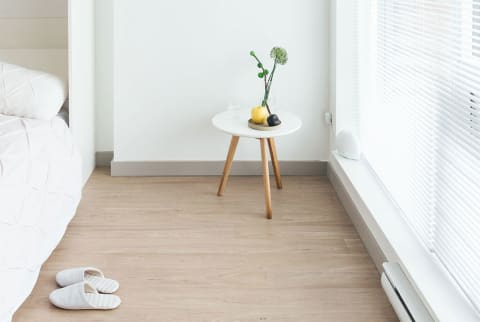Advertisement
6 Things Toxicity Experts Want You To Stop Doing In Your Bedroom


No surprise here: It pays to keep your bedroom clean. After all, it's probably the room you spend the most time in at home. If you tend to wake up with a stuffy nose or itchy throat morning after morning, it could be time to swap out these six dirty habits with expert-recommended cleaning alternatives:
Don't skimp on vacuuming.
Especially if your bedroom is carpeted, Caroline Blazovsky, the founder of My Healthy Home, says it's essential to vacuum at least once a week. Her rule of thumb is to run the machine according to how many people and pets live in your household. So if you have two people and two pets, that means vacuuming four times a week.
It might sound excessive, but building biologist and environmental consultant Ryan Blaser says that staying on top of vacuuming is especially important in the bedroom since it's often home to so many dust mites. Between the mattress, the floor, and any upholstery, the room has plenty of surfaces for these mites to gather, potentially triggering allergies and respiratory irritation in the process.
Blazovsky recommends vacuuming with a machine that has a HEPA filter to pick up all that tiny dust and debris. If you have wood floors, you can go a little longer between cleans, but you should be sure to air out your rugs and vacuum underneath them every once in a while.
Don't neglect the bed.
Since we spend so much time in our beds, we tend to leave a lot of sweat and dead skin cells behind in them. (Apologies for the visual!) This means it's essential to clean bedding regularly, at temperatures that are hot enough to kill germs, bacteria, and mites.
Blazovsky recommends running sheets and pillowcases through the wash once a week, in water that's at least 140 degrees Fahrenheit. If you're not sure how hot your water gets, she says you can take a meat thermometer to it and adjust the temperature at your water heater if you have access to it. Be sure to use a natural detergent so as to not irritate sleeping skin. (Peep 12 of our favorites here.)
As her sheets are taking their hot soak, Blazovsky likes to vacuum her mattress and pillows using a special tool designed for the bed, to get rid of any dust and dander that may have seeped in. Blaser adds that using a mattress protector can also help keep your sleep sanctuary clear of any nasties.
Don't forget to tackle super-dusty areas.
Along with the obvious spots like the bed and floor, Blaser says it's essential to occasionally wipe down the top of window sills and baseboards—both areas where lots of dust can go unnoticed. And as much of a pain as it is, he adds that it's important to clean the area underneath your bed regularly, as it can get the dirtiest of all.
Don't forget to clean your humidifier (and the area around it).
Depending on where you live, you might keep a humidifier in your bedroom to add moisture back into the air. If you do, Blaser and Blazovsky have a few suggestions: For starters, you'll want to empty out and wipe down your humidifier's water tank between uses to prevent bacteria—and potentially mold—from forming inside.
Be diligent about cleaning the area around your machine too, as Blaser says it's fairly common to find mold in the carpet underneath a humidifier, where moisture tends to accumulate. "You want to put it on a solid surface or move it around," he suggests. Finally, depending on your tap water quality, swap the tap water in your machine out for distilled.
You can also add some humidity back into your bedroom air without a machine using these little tips and techniques.
Don't store personal care products in the bedroom.
Anything that's super fragrant—be it a candle, beauty product, or cleaner—could be emitting potentially irritating volatile organic compounds (VOCs) into the air. To play it extra safe, Blazovsky leaves her scented products out of the bedroom in the name of better air quality as she sleeps.
Don't load the room up with electronics.
Finally, Blaser, also an EMF home inspection expert, recommends keeping electronics out of the bedroom—or at least eight feet away from the bed. Keeping the room as device-free as possible can also improve your sleep by reducing your temptation to work or scroll before bed.
The bottom line.
The average bedroom gets real grimy real fast. But by keeping certain things out and bringing certain cleaning habits in, you can maintain a clean, clear sanctuary that's fit for your best rest.